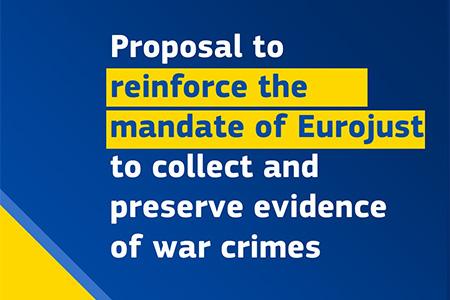
Today the European Parliament adopted the Commission's proposal to reinforce Eurojust's mandate to collect and preserve evidence of war crimes. Following the provisional agreement by the EU Ambassadors yesterday, it would now be for EU Ministers to formally adopt the amended Eurojust Regulation before it could enter into force.
On this occasion, Vice-President for Values and Transparency Věra Jourová and Commissioner for Justice, Didier Reynders, said:
“The atrocities committed in Ukraine must not go unpunished.
There is an unprecedented mobilisation of national and international prosecutors working together to bring those responsible to justice. For this, evidence is key. Due to the ongoing conflict in Ukraine this evidence is not safe in Ukraine. We need a central back-up storage, where evidence can be securely preserved and assessed.
The EU is delivering on its part. The swift agreement to reinforce the mandate of Eurojust, is another proof of our resolve and unity. We welcome the commitment of the European Parliament and the Council, under the French Presidency, to find an agreement on our proposal presented only last month. Eurojust will now be equipped to serve as the central hub to preserve, store and analyse evidence on war crimes.
We remember the atrocities committed in Bucha, Krematorsk and other Ukrainian cities. The EU will do everything in its power to hold those who committed them accountable. There will be no escaping of justice.”
The reinforced mandate will allow Eurojust to:
- preserve, analyse and store evidence centrally;
- exchange such evidence with national authorities, the International Criminal Court (ICC) and other countries, in full respect of EU data protection framework;
- process additional types of digital evidence, such as videos, audio-files and satellite images.
Next steps
The amended Eurojust Regulation will have to be formally adopted by the EU Ministers. The Council and the European Parliament will sign the amended Regulation, followed by urgent publication and immediate entry into force.
Background
Following the atrocities in Bucha, in Ukraine, President von der Leyen spoke with Ukrainian President Volodymyr Zelenskyy, agreeing to ensure a close cooperation. President von der Leyen tasked Commissioner for Justice, Didier Reynders, to follow-up and support the coordination of the EU efforts to investigate war crimes and crimes against humanity committed in Ukraine.
Since then, Commissioner Reynders spoke with the Ukrainian General Prosecutor, Minister of Justice as well as the President of Eurojust to assess the needs on the ground and the support needed.
On 12 April, Commissioner Reynders sent a letter to EU Justice Ministers to call for further coordination at political level on this matter. Following the successful launch of the Freeze and Seize Task Force, the collection of evidence and support of investigations into war crimes is another area where the Commission together with the Member States and partners can take meaningful action. The Commissioner asked Ministers to assist with a list of requests he received from the Ukrainian Prosecutor General. This includes, for instance, requests like the provision of investigators to document war crimes; experts with forensic expertise; equipment for the secure storage of evidence, secure lines of communication or on-the-job training for investigators.
The Commission is also supporting these efforts financially, be it through funding for equipment, experts or the work of the genocide network which has started to train judicial authorities for building cases on war crimes. The EU is also launching a dedicated €7.5 million project to support the investigations with ensuring large data collection on missing and disappeared persons.
HRVP Josep Borrell also announced that the European Union Advisory Mission (EUAM) that was already in Ukraine before the war, will now also be tasked to cooperate with the Ukrainian General Prosecutor to ensure investigation and collection of evidence on the ground.
The Ukrainian General Prosecution Office, 11 EU Member States and the Office of the Prosecutor of the International Criminal Court (ICC) have opened investigations for war crimes and crimes against humanity committed in Ukraine. The Ukrainian prosecution office has established a dedicated homepage, requesting citizens to register and document such crimes. There is around 10,000 registered incidents of war crimes and crimes against humanity in Ukraine, against more than 650 suspects. An EU Joint Investigation Team (JIT) was set up with Poland, Lithuania and Ukraine, supported by Eurojust. Eurojust and the International Criminal Court (ICC) agreed on 25 April to join forces and for the Court to participate in the Joint Investigation Team. Other Member States are expected to join the JIT. The Genocide Network, hosted at Eurojust, has started training sessions for judicial authorities in the Member States and in Ukraine to enhance case building for core international crimes.
Eurojust, together with the Genocide Network, has the necessary expertise in preserving and handling evidence related to war crimes and other core international crimes. They have successful operational experience in prosecuting war crimes and crimes against humanity by supporting recent JITs established between several Member States that led to convictions in the context of international crimes committed in Syria and Iraq. However, Eurojust's legal framework does not currently provide for the possibility of Eurojust collecting, preserving, analysing and sharing evidence relating to core international crimes nor to directly cooperate in this regard with the International Criminal Court. In this context, Eurojust will also cooperate with Europol in accordance with their respective mandates.
For more information
Factsheet on Russian war crimes in Ukraine: Reinforced mandate for Eurojust
Details
- Publication date
- 19 May 2022
- Author
- Directorate-General for Neighbourhood and Enlargement Negotiations
